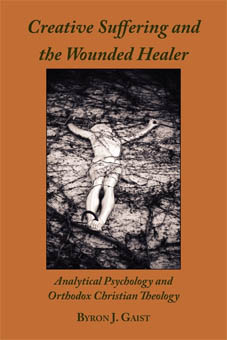CREATIVE SUFFERING AND THE WOUNDED HEALER

Analytical Psychology and Orthodox Christian Theology
by Byron J. Gaist
Paperback (April 2010)
ISBN: 978-1-933275-40-6
Price: $29.95 + S&H (USD)
It is frequently acknowledged that, despite Jung's disclaimers concerning the mutually exclusive boundaries between empirical science and metaphysics, analytical psychology does have important theological ramifications. Christian theology has been a historical antecedent to modern psychology, and can continue to be of relevance in this field through the scholarly exploration of its anthropological teachings in a contemporary academic and pastoral context. The primary purpose of this study is to outline a metatheoretical approach to discuss the interface between analytical psychology and Christian theology. As a secondary theme, it attempts to formulate, investigate and explore a theoretical rationale for adopting a depth-psychological approach to working with countertransference dynamics in both psychotherapy and spiritual direction, by including and valuing the spiritual dimension of experience. The concept of ‘creative suffering’ is utilized as a way of describing the process through which personal suffering, when experienced creatively, becomes more than the isolated pathological source of the therapist’s private emotional wounds, being transformed to provide the main psychological background through which deep healing of the client's own trauma may occur on a personal and transpersonal level. It is, therefore, argued that creative use of the countertransference implies ongoing, active reflection by the therapist on the meaning and purpose of personal suffering, as occurs in some spiritual disciplines. This practice is adumbrated through a framework of conceptualisation derived from Orthodox Christian spirituality, employing the Jungian archetype of the ‘Wounded Healer’ in parallel to theological claims concerning the suffering of Jesus Christ, and the broader significance of suffering and evil in Christian theology. Parallels, similarities and differences between religious and psychological imagery and concepts are suggested throughout, which may prompt further exploration of areas of convergence and divergence between analytical psychology and Christian theology in particular, and between psychology and religion in general.
ABOUT THE AUTHOR
Byron J. Gaist is an Orthodox Christian psychotherapist based in Cyprus. He has worked individually and in groups with a diversity of clients in England, Germany, Cyprus and elsewhere, and has presented his work in seminars, conferences, trainings and other professional events relating to mental health and wellbeing. With an M.A. in Theology and Religious Studies from the University of Leeds, and a Ph.D. in Psychoanalytic Studies from the University of Essex, his major interest is in the interface between psychology and spirituality, and in particular the integration of psychology and Christian theology. Dr Gaist also takes an active interest in the arts, finding much recreation in looking at paintings, reading and playing the classical guitar.
PUBLICATIONS


